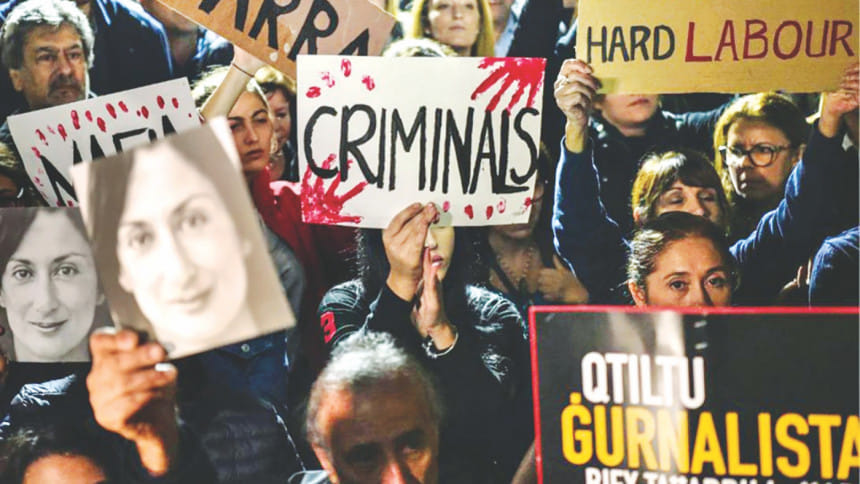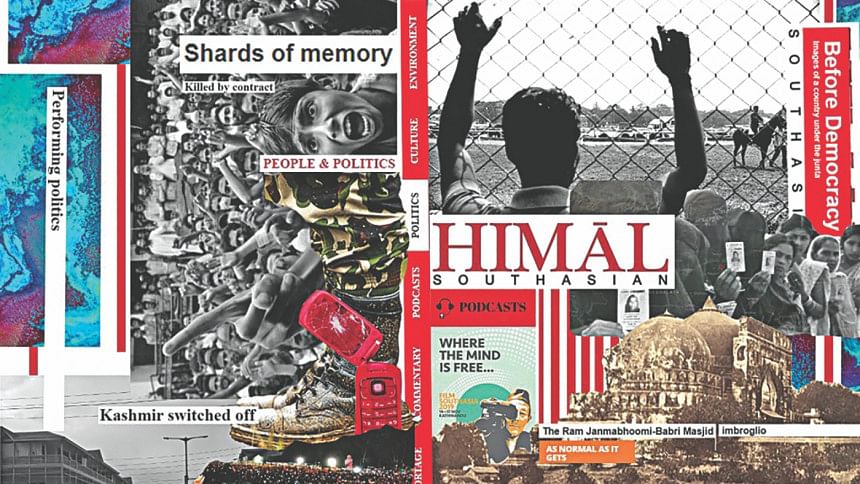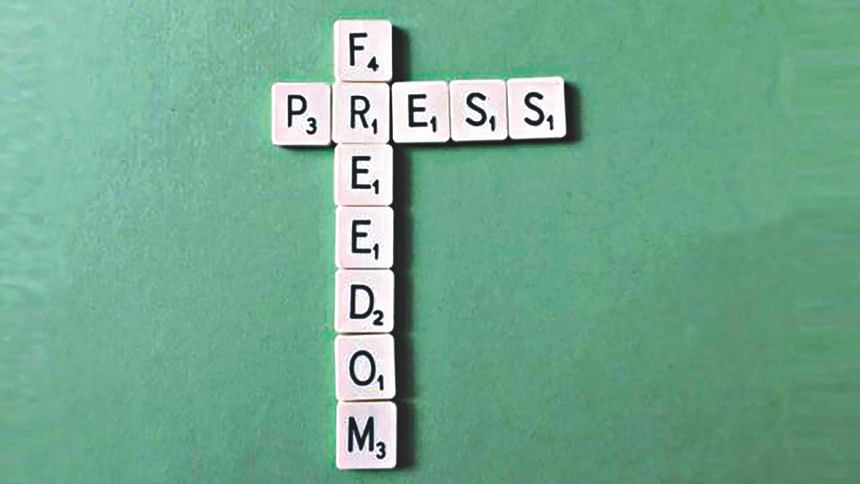Journalism as a catalyst for good, sustainable governance

On the surface, the proposition that portrays journalism as a catalyst for good, sustainable governance might appear straightforward. If only matters were that simple! Four factors—journalism, catalyst, good and sustainable, and governance—each important on its own, make up the proposition, and each needs to be weighed individually, and in relation to one another. In the Internet Age, journalists are frequently faced with audiences that are often more sceptical, less interested, and more scattered than before the seminal product of the fourth industrial revolution announced itself on humankind. They confront a political world that is undergoing its own profound changes and work on their own, or for media companies locked in ever stringent competition in a rapidly changing business environment. Not that the traditional media has disappeared. Far from it. No matter the advent of the Internet, traditional media will not become relics of history anytime soon, if ever; it will find ways to reinvent itself. As a point of interest, the Internet itself is also known as the new media.
A crucial component of the proposition is the issue of journalism being a catalyst, or facilitator. The point to be noted here is not that it is not, or cannot be, a catalyst. The observation of the Anglo-Irish statesman Edmund Burke in the British Parliament in 1787 rings true now as it did then: "There are Three Estates in Parliament, but in the Reporters' Gallery yonder, there sits a Fourth Estate more important far than they all." The point here is just how much of a catalyst the Fourth Estate can be in the different governance settings across polities. It stands to reason that, given the varying characteristics of polities across the world, democracy, or, more specifically, liberal democracy, would presumably be the one on which journalism would have the most telling catalytic effect. Taking this point further, liberal democracy, and one of its by-products, a free media, are necessary for good governance. And, yet, instances abound that a free media in a democracy does not result in good, or even reasonably good, governance, let alone a sustainable one. Then there is the interesting case of China, which has effective governance in terms of the welfare of the country and its people in spite of not being a liberal democracy or having a free press. The noteworthy point is that, in spite of expected trials and tribulations, in the first quarter of the twenty first century, journalism is still, for good and bad, at the heart of politics.
That brings us to the factors of good and sustainable in terms of governance. "Good" denotes governance that works for the people of a country, but there are more connotations to it than this general statement. Probably the more important of the two is "sustainable", where the benefits of good governance is not a flash-in-the-pan contribution of one regime, but one that has become an integral part of the system and state of governance, regardless of which regime is in charge of it. After all, probably not many will dispute that bad governance is regarded as a prime cause for all the ills that beset any society. Regarding good governance, the United Nations Economic and Social Commission for Asia and the Pacific characterises it in these terms: "the process of decision-making and the process by which decisions are implemented (or not implemented). Governance can be used in several contexts such as corporate governance, international governance, national governance and local governance." Purportedly, journalism can act as a catalyst to bring this situation about. At this juncture, a whole slew of variables come into play, with the media's generally viewed role by a number of commentators being the issue.

To revert back to Burke's astute observation about the media, probably its most important role is as a watchdog. That entails, by definition, it being unfettered by political, corporate, or social influence. It will act as a forum for political debate, and set agendas for such debates (the American presidential debates, both for gaining the party nomination and the office of the president, arranged and conducted by mainly broadcast TV networks, are proof of such media participation). Ostensibly, the public platform thus provided by the journalistic community will lead to public airing of both consensus and differing viewpoints, out of which presumably will emerge constructive issues and viewpoints related to the promotion of good governance and elimination of negative ones. Good governance, as explained by a scholar, is participatory, accountable, transparent, consensus-oriented, effective and efficient, responsible, equitable and inclusive, and follows the rule of law. These are onerous attributes, requiring tremendous determination to formulate and carry out, and the media is supposed to provide a public forum to facilitate their executors' endeavours. Other attributes of good governance entail that corruption is reduced to a minimum, the voices of the most vulnerable in society are heard and implemented, and the views of the minorities are taken into consideration.
The paradox to the establishing of lasting, even short-duration, good governance is that the execution invariably falls on one or, occasionally, all three of the branches of the government that are elaborately addressed in most countries' Constitutions—the Executive, the Legislature, and the Higher Judiciary, whether in a government of union of powers or in one of their separation. The Fourth Estate is left with the task of not enforcing good governance, but of serving as watchdogs on behalf of the citizenry in order for them to be able to enjoy the benefits of good governance. In a way, the media often showcase the adage that the pen is mightier than the sword!
In effect, the media can only suggest, offer panacea for perceived and actual ills, advise, point out problematic issues affecting a society, but not, except under exceptional circumstances, execute a solution. A mature society steeped in the tenets of liberal democracy usually pays heed to the media, if not always agreeing with its offerings. What it boils down to is that an independent media or free press is necessary but not sufficient for strengthening good governance. More than anything, the citizens of a country have to have that indefinable, yet clearly recognisable, mindset for the ethos of liberal democracy that will crucially aid in the working of a free press/independent media that, in turn, will be able to function as the watchdog for the society in terms of the abuse/misuse of governance. It entails the robust working of channels of mass communication that are free and independent of government censorship. It also entails that the citizens have widespread access to the media. Together the two will see to it that the media will take up the cudgel against any penchant for giving public viewpoints a short shrift or setting aside marginalised groups' opinion in the pursuit of abuse of power.
So, the path to liberal democracy is uneven across countries of the world, that is, in those countries where at least a semblance of democratic ideals is practiced. And there is no guarantee that those ideals will be practiced eternally. Fareed Zakaria, an Indian-American journalist, political scientist, and currently widely known as the host of CNN's Fareed Zakaria GPS, predicted in an article in Foreign Affairs in 1997 that, while the world would witness a rise in the institution of democracy, it would not be of the good kind. He named this phenomenon as the spread of illiberal democracy. In order to distinguish it from the tenets of liberal democracy, he introduces a critical distinction between democracy and liberalism. Liberalism, he states, connotes the norms and practices that shape political life, while democracy is the process for choosing political representatives and leaders. Usually there is a direct positive correlation between the two, but, over the last several years, that harmony seems to have been placed at odds in the old advanced democracies like the US and the UK. Through the democratic mechanism of election, Donald Trump was elected President, and Bris Johnson, the Prime Minister, of the US and the UK, respectively. Both are ultranationalists who, and Trump in particular, have used the electoral process of liberal democratic tradition to foist and pursue policies that are anathema to the spirit of liberal democracy. And both, but especially Trump, have made the media (except those that back them) the villain for doing their job of being the watchdog of their respective societies.
And, for all their foibles, and there have been some notable ones, the journalists in both those countries have unearthed policies and actions taken at the highest levels of government that have run counter to both the letter and spirit of liberal democracy that have been at the heart of their political ethos and values. Examples abound attesting to such deeds where the courage and integrity of investigative journalists have turned the attention of the citizenry of the US and the UK towards the slide in basic values and ethos that defined them. The Watergate scandal in the US (which began in 1972), we might recall, was exposed in large part through the efforts of two young journalists working for The Washington Post, Carl Bernstein and Bob Woodward, and their news story was allowed to run in that newspaper by its perspicacious and courageous executive editor Ben Bradlee. It eventually resulted in the voluntary resignation in 1974, when it became clear that he was going to be impeached, of President Richard Nixon. It was a case of investigative journalism at its best working to expose abuse of power at the very highest level of government by a person whose office was (and continues to be) tagged by the Americans and others as being the most powerful in the world.
This is just one high profile case that journalists helped break, but, over time, the media, ranging from the newspaper to the TV to the radio to the Internet have broken many small, medium and high profile stories dealing with corruption, abuse/misuse of power and poor governance in the US, UK, and other countries. Long before Watergate, the doyen of broadcast journalism, the American Ed Murrow, took up the axe against real and perceived demeaning of American values and the Constitution as a fearless and relentless radio and TV journalist of CBS. He led the censure of US Senator Joseph McCarthy, he of the Red Scare notoriety, who seemed to find a Communist under almost every American bed, and led a witch-hunt that falsely implicated many innocent American lives and negatively affected many of them (including the great film director Orson Welles of Citizen Kane fame). Interestingly, McCarthy used tactics to root out (mostly imaginary) Communism and its adherents from the US by using tactics that the avowed Communist countries used to subdue regime opponents.
Another CBS TV news anchor, Walter Cronkite, who was dubbed the most trusted man in the US in the 1960s and 1970s in opinion polls, helped shape the face of US news. His commentary on the Vietnam War following the Tet Offensive (during which he stationed himself in Vietnam for a protracted period), in which he declared that the war could only end in a stalemate, prompted then US President Lyndon B Johnson (who had escalated that conflict) to lament that if he had lost Cronkite he had lost Middle America, and some people believed that it was critical in influencing his decision not to run for re-election in 1968 (which, ironically, was won by Richard Nixon). Murrow and Cronkite shared certain values about the importance of public affairs and how news should be presented. While they explored instances of faulty governance and misuse of power, they probably prevented far more abuse of power and authority by the very latent threat of getting exposed by honest journalism. This effect of prevention before cure, or nipping misgovernance in the bud, is real and quietly effective.

Subsequent to Murrow, Cronkite, et al, the splendid tradition of good, conscientious journalists going about their job of being society's watchdogs and upholders of democracy has continued in the US, UK, and many other countries. In fact, a fair number of countries are doing better than the US in terms of freedom of the press, as the latest World Press Freedom Index ranks the country 43rd out of 180 so listed. While this might come as a shock to many people, a section of whom will be cognisant that the US Constitution, through its First Amendment enacted over two hundred years back, protects free speech and free press, others will see it as the importance of the press in other countries in being able to act as a watchdog for the people and the governance situation. Not that this role automatically ensures good, sustainable governance, but it could at least keep impulses for random abuse of power and poor governance under some restraint. For the expected good to happen, to reiterate a point made earlier, the mindset for liberal democracy must become a part of the general citizenry's persona.
Nonetheless, except in a totalitarian country, the very existence of the media creates an atmosphere of some self-restraint in those in charge of governance. This point has been amply illustrated by the blistering attack launched repeatedly by Trump on the media whenever it gives a negative assessment on his many plans and policies. His characterisation of the media as offering fake news and being the biggest enemy of the people, of course, does not include Fox News and those media outlets that faithfully endorse and extol his plans and policies. Eventually, he discards some of his more criticised (by the opposition politicians, the media, and experts) programmes, but he continues his vitriolic attacks over Twitter (which, by the way, is a tool of the New Media!). One can only imagine what Trump would have done to good governance if the critical media had not been there to observe and report.
Fake news exists, as it did before the Internet. With the Internet and its freewheeling nature (that requires a separate write-up) in operation, it will not be anytime soon that the problems related to it will be sorted out. But the media's absolute necessity will not fade away. In fact, in spite of the proliferation of the Internet and its offerings, the venerable traditional media have managed to attract readers and viewers. The Wall Street Journal, the largest US newspaper in circulation, has a daily paid-for circulation of 2.1 million, USA Today is at second place, New York Times third with 487,000 in 2018. Washington Post had a daily circulation of 356, 768 in 2015. In the UK, London Times sold 417,248 daily in 2019, Daily Telegraph 308,015 in 2019, The Guardian 130,496 in 2019, and the magazine The Economist has a weekly sale of 1.5 million (of which half is sold in the US). They all have substantial digital perusal, with The Economist having 36 million per week over the social media.
Whether it is the traditional or the social media (notwithstanding some of its dysfunctional or abusive characteristics), journalism remains, and will remain, a Fourth Estate. While it is a sad truth that some journalists in the most affluent countries practicing democracy, not to say in not so well-to-do nations with a dubious record in the practice of liberal democracy, have at least a symbiotic relationship with the power structures (both political and financial), there are enough journalists who carry out their watchdog roles dutifully and, at times, with risk to their physical well-being. And, lest we overlook the dictum, there can be no democracy without the media. And, to borrow Washington Post's current motto, Democracy Dies in Darkness. That light to clear away the darkness has to come in no small measure from dedicated journalists performing their watchdog roles.
GM Shahidul Alam is a Thespian and Professor, Media and Communication Department, Independent University, Bangladesh.

 For all latest news, follow The Daily Star's Google News channel.
For all latest news, follow The Daily Star's Google News channel. 



Comments